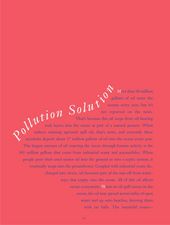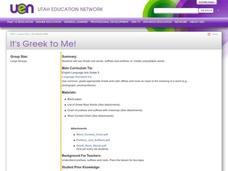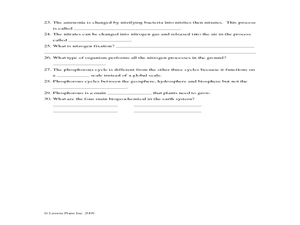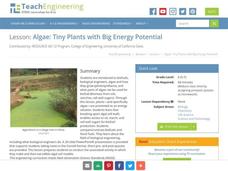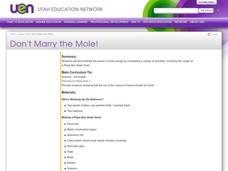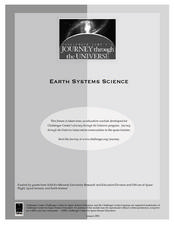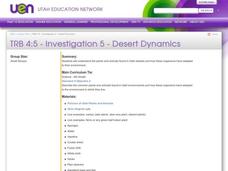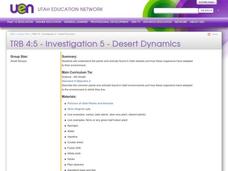Curated OER
It Ain't Easy Being Green!
Students explore the needs of plants. In this science lesson, students plant seeds and place one in a sunny spot and the other in a dark area. Students observe what happens.
Columbus City Schools
Changes All Around Us
Whoa! What just happened? That's right, change is everywhere. But what exactly is changing? Middle school science sleuths get to the bottom of the changes matter can experience. Through simple demonstrations, engaging videos, and an...
Curated OER
Fall Slumbers
Students observe changes in a selected tree leaf near their homes during the fall. Twice each week students record changes in the leaf using words, pictures, and numbers.
Curated OER
Energy Extravaganza
Tenth graders study how cells and organisms acquire and release energy through photosynthesis and cellular respiration. They explain that living organisms use matter and energy to synthesize a variety of organic molecules and they will...
Curated OER
BIoluminescence
High schoolers investigate the concept of bioluminescence. They use dinoflagellates in a lab situation to study photosynthesis. They conduct research into the concept using a variety of resources. Also the class is taken on a field trip...
Curated OER
Pollution Solution
Fourth graders examine how trees help to absorb the pollution that is emitted from automobiles. They review the process of photosynthesis and determine how forest management is important on their reservation. They think about the...
Curated OER
Circle of Life
Here is a well-designed science lesson that shows learners that everything that organisms do in ecosystems, including running, breathing, burrowing, growing, requires energy. After a thorough discussion of their own eating and drinking...
Curated OER
It's Greek to Me!
Use Greek roots, suffixes, and prefixes to create polysyllabic words. Readers use the dictionary to identify what the word's prefix, suffix, and root or base word mean. They define what a syllable is and how one is formed using Greek...
Curated OER
Biogeochemical Cycles Study Guide
The four cycles in Earth's biogeochemical system are covered in this instructional activity. Science stars fill in the blanks or define vocabulary terms pertaining to the hydrologic, carbon, nitrogen, and phosphorous cycles. This...
Teach Engineering
Corn for Fuel?!
Can corn power the world? Young scientists learn about how corn and other plants can provide renewable biofuels in the second of nine lessons. They set up an experiment to investigate how different variables affect plant growth. All of...
Teach Engineering
Algae: Tiny Plants with Big Energy Potential
My, what big energy potential you have! Scholars learn about the energy potential of using algae as a biofuel. A PowerPoint presentation first describes the structure of algae and then how researchers use algae as biofuel to produce energy.
Curated OER
Being Productive in the Arctic Ocean
Students identify the three realms of the Arctic Ocean, and describe the relationships between these realms. They identify major factors that limit primary productivity in the Arctic Ocean.
Curated OER
What Do Plants Need?
Students experiment with plants. In this plant lesson, students research the needs of plants. Students determine if all plants have the same requirements for growth. In small groups, students experiment with different plants.
Curated OER
Circle of Life
Students consider why we eat and where our food obtains its energy. They illustrate food chains that might be found on an open field, dissect owl pellets, identify the remains of animals in the pellets, watch videos and participate in...
Curated OER
Parts of a Plant
Children explore the parts of a plant (flower, seeds, stem, leaves, and roots) using a dandelion as an example.
Curated OER
Don't Marry the Mole!
Third graders demonstrate the power of solar energy by completing a variety of activities, including the creation of a Pizza Box Solar Oven.
Curated OER
How Does a Green Plant Grow?
Students examine how a seed grows, and design an experiment to explore this concept. They make predictions, conduct the experiment, record the results, and interpret the results.
Curated OER
Biochemical Cycles: Recycling Carbon and Nitrogen
Students construct flow diagrams of the carbon and nitrogen cycle processes. They identify sequences in each cycle that are affected by human impact and present their research to the class.
Curated OER
Cell Energy-Colorful Respiration
Students examine the acid-base indicator, bromthymol blue (BTB), and what happens to it when you blow air into it or add plants and snails. Through an experiment, they test three different setups of BTB and record the color changes that...
Curated OER
Pollination
Fourth graders explore the pollination process. In this plant biology lesson, 4th graders dissect a flower to identify the parts of a flower and watch a video to see seed dispersal. Students write about the pollination process.
Curated OER
Earth Systems Science
High schoolers perform experiments designed to grow plants and bacteria in a controlled environment. In this ecosystems lesson students investigate varying conditions for growing plants and bacteria.
Curated OER
Desert Dynamics
Students investigate the plants and animals found in Utah deserts and how these organisms have adapted to their environment. They brainstorm ways that desert plants are different from or similar to wetland plants.
Curated OER
Desert Dynamics
Fourth graders examine the various types of plants and animals found in the deserts of Utah. In groups, they discover how the plants and animals have adapted to the harsh environment. To end the lesson, they compare and contrast the...
Curated OER
Bacteria Change Earth's Atmosphere
Tenth graders organize information to explain how photosynthetic bacteria contributed to climatic changes that happened on Earth. Students create a timeline by using a storyboard to tell the story of the change.







